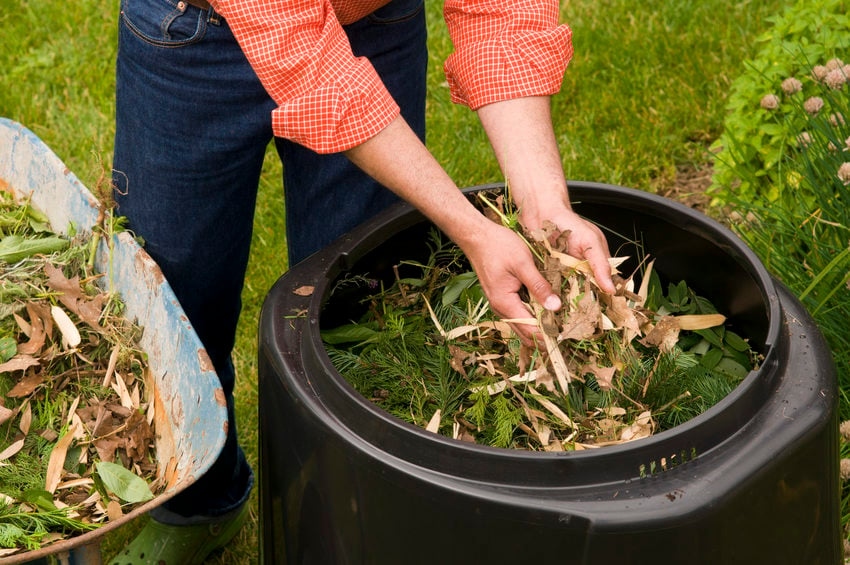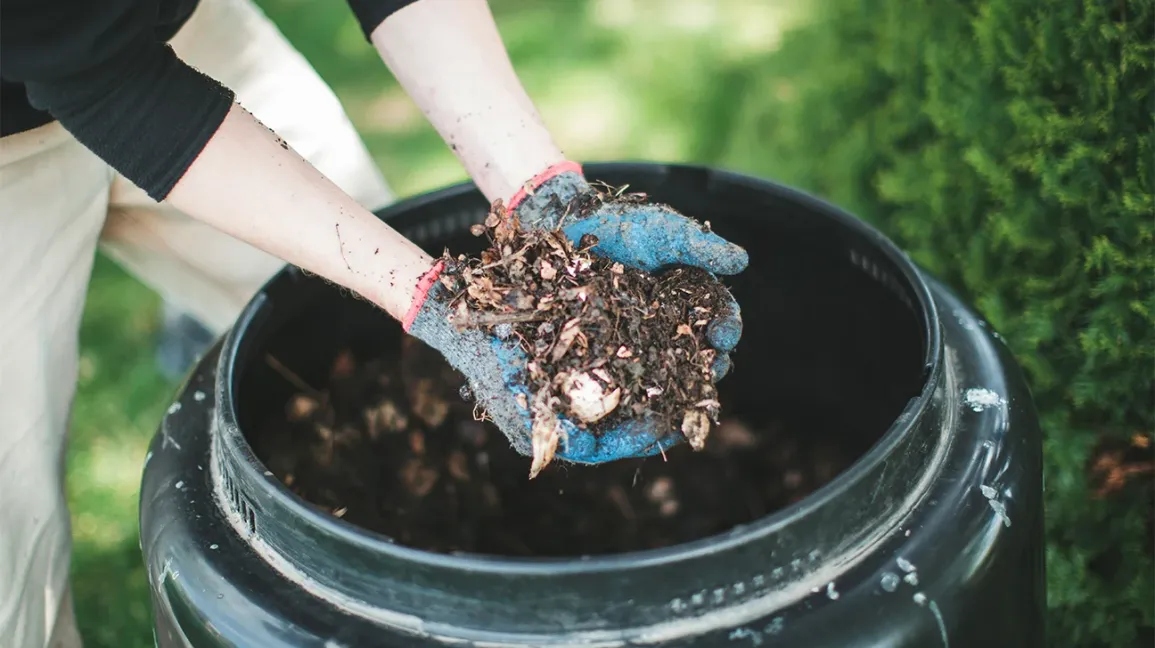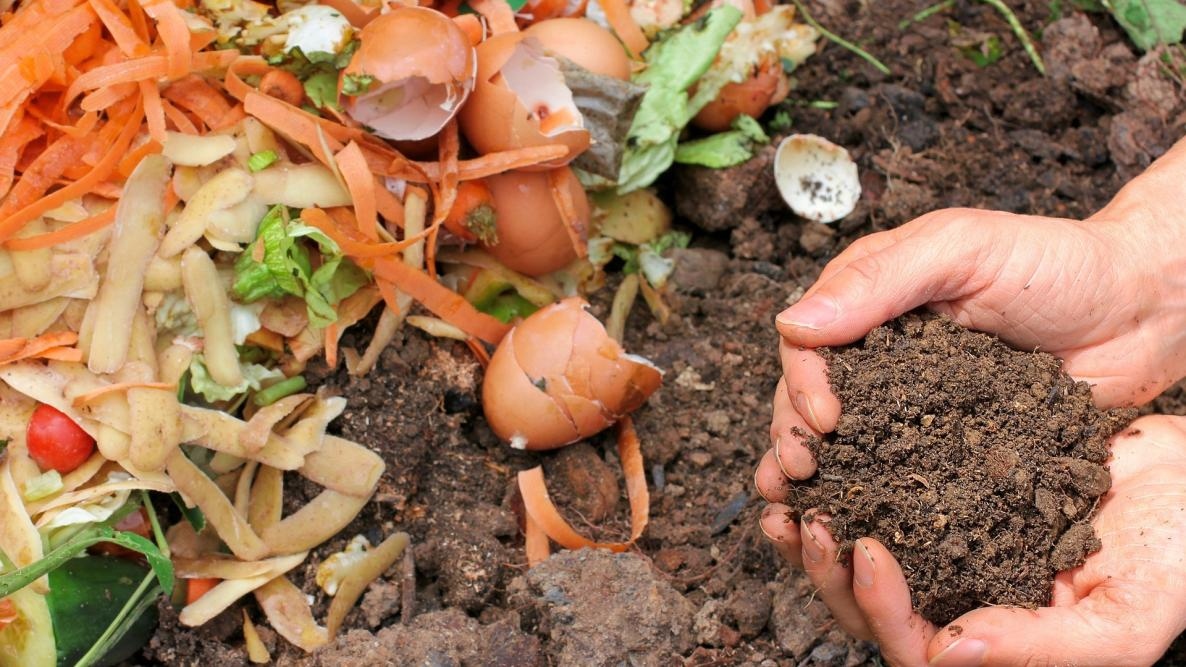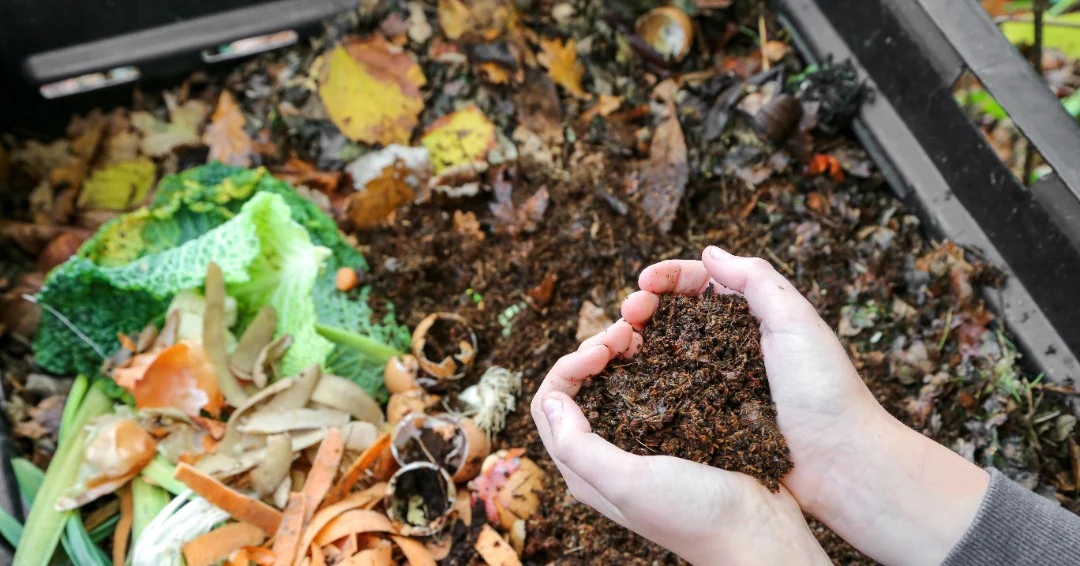Comments
- No comments found

Home composting has emerged as a key player in the quest for greener living.
Have you ever considered what happens to your kitchen scraps, old newspapers, and other compostable stuff you throw away?
Well, there's a way to make them useful while also helping the environment – and it's called home composting. The beauty of nature lies in its balance, turning rotting zucchini and blooming lavender into valuable resources.
Home composting lets us take things we might consider waste and transform them into nutrient-rich soil that can boost our gardens and landscapes. In this guide, we'll break down the composting process at home.

Imagine compost as nature's recycling process. It results from bacteria in the soil breaking down biodegradable trash and garbage. The outcome is a mineral-rich substance that works wonders as an amendment for gardens and landscapes. What's great is that you can add compost to your soil all year round without worrying about harming plants or polluting water.
In contrast, the incineration process, which is often used as an alternative waste management method, involves burning waste materials at high temperatures. This releases pollutants into the air and contributes to environmental issues like air pollution and greenhouse gas emissions. Unlike composting, incineration can harm the environment and public health, making composting a more sustainable choice for managing organic waste.
You might have seen community gardens with multiple bins at different stages of decomposition, but don't worry – you don't need a fancy setup. Even a small space, like a patio or balcony, can work for composting. At its simplest, all you need is a pile in a corner of your yard. As long as it's about 4 feet high, wide, and deep, it's good to go. But if you want a neater setup, wooden pallets or a purpose-built plastic bin can help keep things tidy.
Let’s see how the composting process at home aligns with the “5Rs of waste management."
Reduce: Home composting helps reduce the amount of organic waste that ends up in landfills, minimizing the overall waste generated by a household. By composting at home, we reduce the load on municipal waste management systems.
Reuse: Composting allows us to reuse our kitchen scraps, yard trimmings, and other organic waste, turning them into a valuable resource for our gardens and plants. It's a way to reuse what might otherwise be discarded.
Recycle: Composting is a form of recycling for organic waste. Instead of sending it to a landfill where it would produce harmful greenhouse gases like methane, we recycle these materials back into the earth as nutrient-rich compost.
Rot: Rot is a central aspect of composting. Organic matter decomposes and rots over time, breaking down into a beneficial soil conditioner that enriches the soil and promotes plant growth.
Repurpose: Composting repurposes kitchen scraps and other organic waste, giving them a new purpose as a natural fertilizer. This repurposing completes the waste cycle, transforming it into a valuable resource for our gardens.
What can be composted? Well, almost anything organic can go into your compost pile. Leaves, grass clippings, shredded newspaper, wood chips, veggie scraps – they're all fair game. Here's a quick rundown of what else can join the compost party:
Coffee grounds and tea (most tea bags need to be torn up before adding)
Dry goods like crackers and spices
Eggshells
Hair
Nutshells
Cooked or uncooked pasta
Seaweed
Shredded paper and cardboard (the non-glossy kind)
Bedding from small pet habitats (like guinea pigs or rabbits)
Knowing what can’t be composted is important. There are a few things that don't belong in your compost pile, like non-organic materials (glass, metal, plastic, etc.), animal products (bones, seafood, meat, dairy), and grease. While eggshells are okay, avoid adding dog or cat waste, as well as kitty litter. Also, if you're getting grass clippings from others, make sure they don't use weed killers on their lawns – those chemicals can mess up your compost.

Composting is like a gift that keeps on giving. You're using up stuff that would've been trashed, which means you're cutting down on waste. Plus, you can save money on landfill fees. Your plants will thank you too – compost-rich soils lead to healthier growth, better root development, and improved soil structure. You won't need to buy as much fertilizer either, as compost is packed with the nutrients plants love.
Home composting offers numerous benefits for both the environment and individual households. Here are some of the key advantages:
Waste Reduction: Composting diverts organic waste from landfills, reducing the amount of trash in landfills. Organic waste can make up a significant portion of household waste, and composting helps alleviate this burden on waste management systems.
Rich Soil Amendment: Compost is a nutrient-rich, organic material that improves soil quality. It adds valuable nutrients, enhances soil structure, and increases its water-holding capacity. This leads to healthier plants and better crop yields in gardens or on farms.
Reduced Need for Chemical Fertilizers: By using compost to enrich soil, you can reduce the need for synthetic chemical fertilizers. This is not only cost-effective but also helps mitigate the environmental impacts associated with the production and use of these chemicals.
Decreased Erosion: Compost helps prevent soil erosion by improving soil structure. Soil that is enriched with compost is better at retaining moisture and preventing runoff, which protects against erosion.
Lower Greenhouse Gas Emissions: Organic waste in landfills can generate methane, a potent greenhouse gas. Composting helps reduce methane emissions, contributing to climate change mitigation.
Cost Savings: Home composting reduces the need for purchasing commercial fertilizers and soil conditioners, saving you money in the long run. It can also lower trash disposal costs where waste is charged by weight or volume.
Educational Opportunities: Composting at home can be a valuable educational tool for families. It helps teach children about the natural decomposition process and the importance of sustainability.
Local Food Production: High-quality compost from home composting can support local food production, such as growing vegetables and fruits. This can lead to a more sustainable and self-reliant food system.
Community Building: Home composting can be a community-building activity. Sharing composting tips and resources with neighbors and participating in community composting initiatives can strengthen local bonds and promote sustainability.
Reduction in Pesticide Use: Healthy, nutrient-rich soil can lead to stronger, more pest-resistant plants. This may reduce the need for chemical pesticides, promoting a more eco-friendly approach to gardening and farming.
Improved Water Quality: Composting reduces the need for chemical fertilizers that can leach into water bodies, potentially causing pollution. By enhancing soil health, composting indirectly contributes to improved water quality.
Less Odor and Pest Issues: Properly managed compost piles are less likely to emit foul odors or attract pests. This can help maintain a clean and pleasant outdoor environment.
It's important to note that successful composting requires some knowledge and effort, but the benefits, both at the individual and environmental levels, make it a worthwhile practice for those interested in reducing waste and promoting sustainable living.

Ready to get started? Here's a simple breakdown:
Pick a spot: Choose a discreet location with good airflow, water access, and some shade in summer to prevent overheating.
Choose a bin: You can either buy a composter or make your own. Even a simple pile works, as long as it's around 3x3x3 feet.
Add stuff: Toss in your compostable materials, but make sure to avoid the no-nos we talked about earlier.
Want to be a composting pro? Here are some insider tips:
Use nitrogen-rich stuff like blood meal or manure to speed things up.
Chop or shred materials before adding – smaller bits decompose faster.
Store kitchen scraps in a compost pail to save trips to the pile.
Avoid treated plants and chemicals like pesticides.
Add a bunch of stuff at once to heat up the pile.
Turn the pile regularly to introduce oxygen.
Keep your pile in the sun for active microbes.
Compost activators can help speed things along.
When it's done, compost should look and feel like rich, dark soil.
Finished compost takes up less space than what you started with.
Finished compost is like gold for your garden. It's dense and nutrient-packed, making plants thrive. Apply it about 2-4 weeks before planting to let it integrate into the soil.
So, there you have it – the world of home composting made simple. By transforming your kitchen waste into precious compost, you're not only reducing waste but also giving back to the Earth. Happy composting!
Luke Fitzpatrick has been published in Forbes, Yahoo! News and Influencive. He is also a guest lecturer at the University of Sydney, lecturing in Cross-Cultural Management and the Pre-MBA Program. You can connect with him on LinkedIn.
Leave your comments
Post comment as a guest